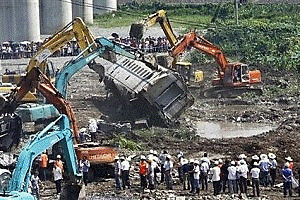
Wenzhou train crash
Within hours of the accident, the Central Propaganda Department, the Information Office, and other governmental agencies jointly issued directions to journalists on how to and what to report. This kind of governmental intention to cover up incidents that may unveil officials’ scandals is not new to anyone familiar with the Chinese state control of social media. However, what is different this time is that Chinese citizens are able to use Twitter-like microblog (“weibo” in Chinese pinyin) to carry out public debates and voice their discontent with governmental mismanagement and lack of transparency.
This is the second wave of serious public discontent with the state’s authoritative practices of the year after the Arab Spring-inspired call for a “Jasmine Revolution” in mainland China in March.
Reporters arriving on the scene the day after the accident found state-employed crews busy burying the wrecked carriages in the mud, as if to conceal the evidence. Rescue workers seemed to be more interested in restoring rail service than in rescuing wounded passengers. The official death toll was thought to be highly volatile and not to be trusted, and many suspect that a cover-up was underway from the commencement of the relief efforts.
Wang Qinglei, producer of China Central Television (CCTV)’s 24 Hours, was fired after criticizing the government in the state media outlet.
On July 26, law firms in Wenzhou received an “urgent document” from the Wenzhou Judicial Bureau and the Wenzhou Lawyers’ Association ordering the lawyers to “report to the judicial bureau and lawyers’ association immediately after the injured passengers and families of the deceased in the accident come for legal help.” It also stated that lawyers “shouldn’t respond and handle the cases in an unauthorized manner,” as “the accident is a major sensitive issue concerning social stability.”
It took Premier Wen Jiabao, who frequently arrives at disaster-stricken areas in China to make commitments on behalf of the government, six days to visit the accident scene, whereupon he pledged a greater focus on rail safety and a “transparent” investigation into the accident. Wen claimed that he was seriously ill. However, a look at his activities suggests that he had been attending State Council meetings, a climate change workshop, and meeting Iraqi Prime Minister Nouri al-Maliki during the six-day period.
In the past, the state was able to promptly eradicate almost any politically sensitive content on the Internet, but now the Chinese microblog users have found a counter-measure to voice their opinions.
Unlike conventional posting online, microblog posts spread faster than censors can react, making posting politically sensitive contents beyond easy control. Another factor making controlling microblogs a delicate matter is their mushrooming popularity ever since they were introduced to the mainland last year. According to the China Internet Network Information Center estimate, the number of registered microblog users surged by 208.9 percent in the first half of this year, hitting 195 million by the end of June.
Shortly after the train accident and the original official allegation that the tragedy was caused by a disruptive lightning storm, a microblogger wrote, “When a country is so corrupt that one lightning strike can cause a train crash … none of us is immune. China today is a train rushing through a lightning storm … we are all passengers.”
The state gradually acknowledged that strong public dissent was only on the rise, as manifested in angry microblog posts, and that covering up or circumventing the issue would be counterproductive at best. Despite initial official mandate on reporting per the official voice, the state-owned Xinhua news agency released a report titled How Did the Major Disaster on July 23 Happen?, raising many difficult and even strident questions about the train accident. On July 28, the judicial bureau of Wenzhou posted an official document on their website apologizing for “lax supervision” over the Wenzhou Lawyers’ Association, which mandated Wenzhou law firms not to handle cases involving the July 23 train clash in an “unauthorized manner.” As of July 30, 10 families have agreed to settle for a compensation of $143,000 per deceased family member, nearly double the originally proposed $78,000.
Qian Gang of the University of Hong Kong discovered that Chinese newspapers on July 29 reached nearly the same depth of reporting and criticism of the incident as their counterparts in Hong Kong, where information regarding accidents is promptly disclosed for public scrutiny.
“Microblogs provided a platform for civic debate on the governmental handling of the train accident, but their influence have been overlooked by many governmental officials,” said Professor Xie Yungeng at Shanghai Communications University. Xie also added that “Some officials don’t even know what microblogs are. They lack an awareness of new media. They are too arrogant to care.”
This Tuesday, the People’s Daily, the Chinese Communist Party (CCP)’s flagship newspaper, published an article titled How to communicate with masses in microblog era (in English), urging officials to respond to Internet users in a timely fashion and not to evade difficult questions.
On the same day, the State Council and the CCP Central Committee jointly ordered increased transparency in governmental handling of major accidents.
Among the Chinese public, the “appetite for the truth” is looming large. Microblogging provides one such venue for the people to question the wrongdoing of the authority, as well as to share opinions and carry out debates on issues of public concern. With the emergence of microblogs as China’s watchdog service, the Chinese authorities should realize that more openness might be conducive to the Party’s first and foremost goal of maintaining social stability.